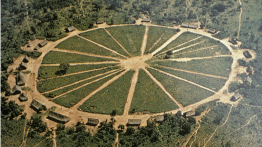Doug Ashford A'81

Doug Ashford A'81 was interviewed in October 2021 by Owen Duffy for Art & Education's School Watch feature for an article "The Past Is Never Over: Cooper Union, Reuben Kadish, and the Education of Artists - Doug Ashford and Owen Duffy" which came out in December 2021.
““I am in love with the work my students have yet to do,” professes artist and educator Doug Ashford. A seemingly perennial fixture at Cooper Union, Ashford graduated from the school in 1981 and in the decades since has served as an adjunct (or “proportional time faculty”) and a full-time instructor. In October 2021, we met just outside the school, on Cooper Square’s park benches, and this conversation unfolded as we dodged falling acorns. I was long familiar with Ashford’s work when we first met in 2016 over a bowl of kimchi jigae in Gwangju, South Korea. And since then, I’ve left our meetings feeling like many of his students must: rejuvenated with a sense of belief in the transformative power of art. During our conversation on that October day, we discussed the legacy of Ashford’s former teacher Reuben Kadish, our mutual distrust of the corporatization of higher learning, and the role of care in education." —Owen Duffy
To read the full interview, please click here.





